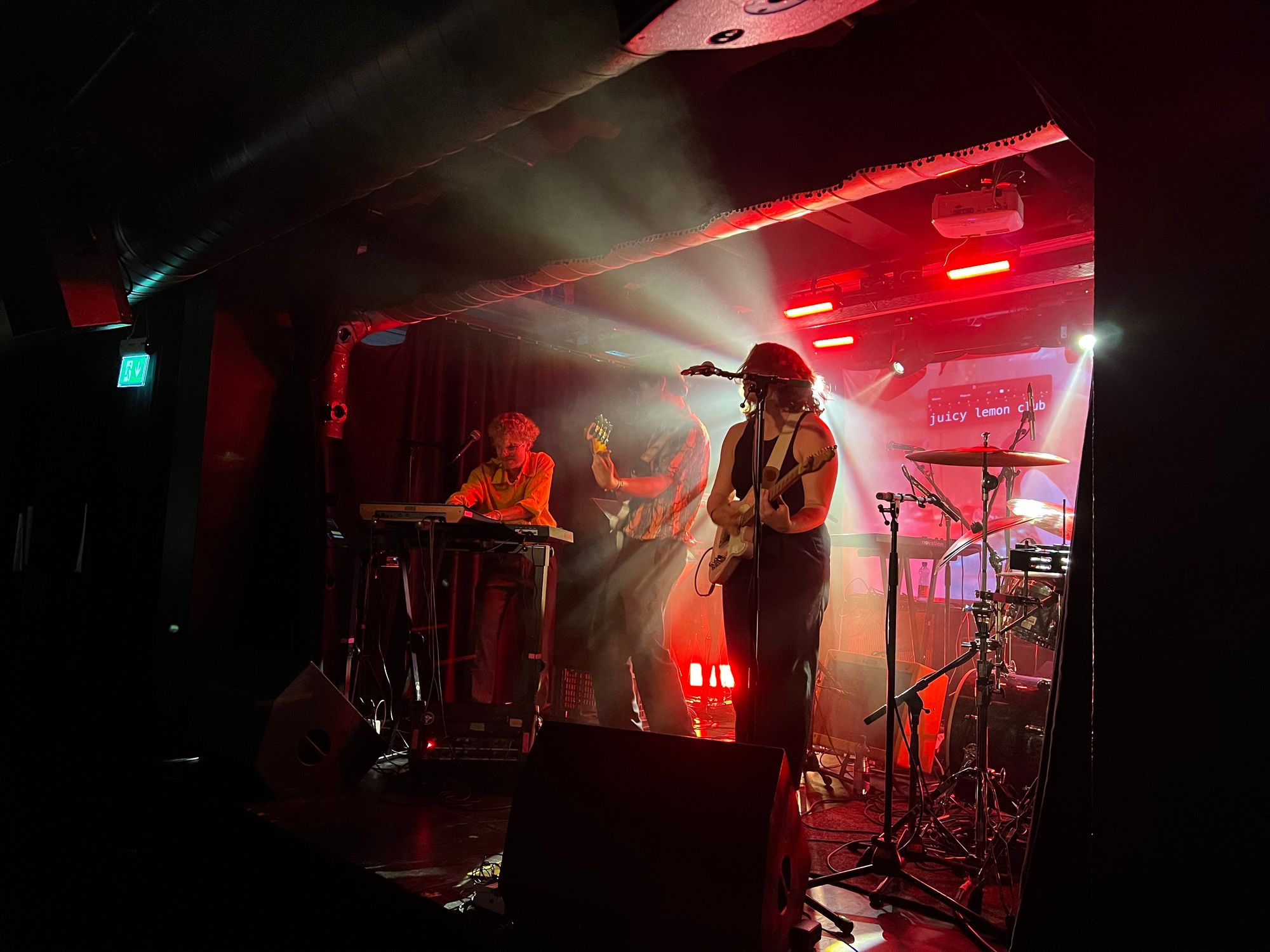Stories
Reports, interviews, essays, and opinions about music and its connection to business and society.
My Top 5 Metal Discoveries
Throughout the past months, a handful of astonishing metal bands crossed our paths for the first time. Here are some of our editor's favourites.
The power of metal to captivate and enthral its listeners is truly unique. The intense sound created by heavy riffs, thundering drums, and hellish vocals evokes deep feelings in those who appreciate the genre.
Especially when experienced live on stage, the music's raw energy and emotional expression bring people together, creating a sense of unity that is hard to find in other forms of music—something I witnessed once again when I attended this year's Summer Breeze Festival in Dinkelsbühl, Germany.
Although only a small portion of my personal heavy rotation accounts for metal, the sound these bands produce is undeniably fascinating. Today, I share five metal acts I recently discovered—some of them rather late, others on their way up.
Blackbraid
Sgah’gahsowáh, the artist behind the one-man band Blackbraid, combines Black Metal's heavy sounds with a focus on nature. Stumbling over a New York Times feature anticipating the second album, Blackbraid II, the combination of themes rooted in his Native American heritage and the raw sound of Norwegian's Black Metal origins instantly intrigued me.
Initially, I expected a more progressive approach to the Black Metal sound, as seen with Zeal & Ardor. However, Blackbraid's sound remains traditionalist, offering pure, aggressive, but excellent compositions.
I Paid 200 Pounds to See The Rolling Stones and Remember Nothing
This is one part cautionary tale, part music appreciation, and part time-capsuled memory of a late-stage teenage mind. It all happened exactly a decade ago.
The year 2013. I, aged 22, was about to start my studies in journalism and decided to travel by train through Europe for a month. It was a surprising, sometimes strange, but inspiring trip that filled almost an entire notebook worth of recorded experiences, moments, and thoughts.
On July 3, the train left Zurich Main Station at 9:33 am for Paris for a journey that would end in London.
A day later, I picked up the most expensive concert ticket I'd ever bought (until then, at least). The Rolling Stones live at Hyde Park—Silver Circle access. 200 pounds I paid, and again 180 for two regular tickets I would later hand over to my aunt and uncle who travelled to London too.
Nothing To Lose, Everything To Win
Thumpasaurus played in Switzerland for the first time, and it was insane.
If you attend a band's first gig in your country, there are two possible futures. Option one: The band gets traction and will play in larger venues. And you'll proudly say: I've seen them in front of 30 people. Option two: They don't break, and you'll forget about them.
I went to see the Californian band Thumpasaurus' first concert in Switzerland to find out.
Admittedly, I only learned Thumpasaurus when an email reached me last Tuesday inviting me to their concert at KiFF's Foyer in Aarau, Switzerland. Now, these emails are rare: Usually, you must ask for accreditation to attend a show as a journalist—at least as a reasonably small blogger. So, automatically, you think: They must be pretty desperate to fill the venue.
But the email sounded enthusiastic enough, and I dove into Thumpasaurus' discography. And, man, it's a wild ride: Imagine a blend of rock, punk, funk, and jazz—that's what you can expect from Thumpasaurus.
The band, formed at USC Thornton's Division of Contemporary Music, plays a sound that defies conventions. «There are no two songs on this album that sound alike, and yet they all THUMP. These guys are eclectic and often swing in unpredictable directions,» Music-Survival-Guide writes about their 2021 album Thumpaverse.
After hammering down the highway to Aarau, my first hunch was correct: Pre-sales were underwhelming. About 30 to 40 people found their way to the venue in the city's industrial area. It was a colourful, diverse crowd: Older jazz enthusiasts, young goth girls, and indie fans.
Opening for Thumpasaurus were Juicy Lemon Club, a newcomer band based in Basel, Switzerland. Founded at the beginning of last year, they commit all their time to making it as professional musicians—winning the «BandX-Nordwest» contest in 2022 and the «Waldbühnecontest» of Gurten Festival this year. From the summer of 2023, they will even give up their education to devote themselves entirely to the band.
You never know where the juice will pop out if you squeeze a lemon, and it's the same with Juicy Lemon Club: Funk, soul, rock, jazz, and the occasional ballad—they all found room in their set organically.

While sometimes, you could still feel their youthful naïvety and innocence, the quartet performed their music with stunning professionalism and infectious joy. Timon Sarbass hit the keyboard like a maniac, Juan Helou slammed the drums like the devil himself, and Philippe Pavlu bent himself to the rhythm of his bass as if his life depended on it. And frontwoman Berenice Courvoisier's voice gained more and more passion.
Then, the insanity started.
«You're not normal,» shouted a woman from the audience at one point. And in a way, she was right. Which US band dares to tour Europe with a new album only on the horizon, releasing either at the end of this year or at the start of 2024? And which band has an additional man on stage, creating weird but hilarious visuals?

Back home, Thumpasaurus already gained a loyal following, received cult status, and sold out large venues. In Europe, especially in Switzerland, nobody knows them. At least their hit Struttin' was in Couleur3's heavy rotation.
And with Struttin' and I'm Too Funky, Thumpasaurus started what only can be described as madness. Everything blurred into an irresistible escalation of verve and pressure.
Thumpasaurus burned an incomprehensible firework of deliriousness that words cannot accurately represent. The rapid groove, almost punk in nature; the sophistication in saxophonist Henry Solomon's or stoic keyboarder Paul Cornish's solos; the wild character of bass player Logan Kane; the otherwordly vocal performance of Lucas Tamaren; the apocalyptic stomping in Evil; the weird fusion of Beatles-like sound, children's song and chamber music in Beta Lupi.
I've never experienced a first show like this: The usually reserved, shy Swiss people just went ballistic. Dancing, jumping, clapping like possessed—riled up by Tamaren's natural showmanship and the band's talent to engage with the audience. You could feel that you're witnessing something extraordinary right then and there.
Thumpasaurus had nothing to lose and everything to win. And they took it all.
Rammstein: A Case Against Unwavering Fandom
Recent allegations shatter Germany's most successful band to its core. What does it mean for fans?
Rammstein are masters of provocation. Now, the most successful German band finds itself in a perfect storm it didn't anticipate.
What happened? On May 25, Irish woman Shelby Lynn accused the band and its entourage.
As she claims on social media, she was chosen by a woman to stand in a separate area in front of the stage at Rammstein's concert in Vilnius, Lithuania, with other young women. They were taken photos of and promised access to parties around the show.
On Instagram, Shelby Lynn described how she was led backstage during a concert break, where she says she was supposed to have sex with 60-year-old frontman Till Lindemann. When she didn't want to, the singer reacted aggressively, Lynn claimed.
Reports Suggest An Exploitative System
Since then, more women have come forward and told similar stories. While these severe allegations remain just that, investigative reports by established newspapers like the Süddeutsche Zeitung paint a picture of an elaborate system that lures young women into the so-called «Row Zero» and to pre- and after-show-parties where allegedly unconsenting sexual acts and drugs were in order.
Rammstein themselves, who should be used to crisis communication, handled the situation poorly so far. The band's first statement read: «With regard to the allegations circulating on the internet about Vilnius, we can rule out the possibility that what is being claimed took place in our environment. We are not aware of any official investigations into this matter.»
Later, they posted on Instagram: «The publications of the last few days have caused irritation and questions among the public and especially among our fans. The accusations have hit us all very hard and we take them extremely seriously.»
Furthermore, the band states: «We condemn any kind of assault and ask you: Do not engage in public pre-judgements of any kind against those who have made allegations. They have a right to their point of view.» The final sentence of the statement reads: «But we, the band, also have a right—namely not to be pre-judged either.»
Recent reports say that Rammstein banned Alena M., the woman responsible for casting the girls, and engaged a PR agency for crisis communication and lawyers.
A law firm representing Till Lindemann on Thursday categorically denied the allegations. «Various women have made serious accusations against our client,» law firm Schertz Bergmann said in a statement. «These allegations are without exception untrue,» the statement reads further. The law firm said, adding that legal action would be taken against the women.
Hard Questions Have To Be Asked
As we can tell by these many reports, the system's existence seems likely. Whether something illegal happened needs to be determined by justice.
However, any system that exploits fans through admiration, dependency created by different power levels, and shame raises moral questions.
And as the concept of «Row Zero» at Rammstein's concerts was reportedly an «open secret» and around for years, many people in the music business might also find themselves in the storm. Nobody spoke up—for years.
Toxic Behaviour Followed
But the recent accusations also raise again the issue of unhealthy fandom. It's a well-worn fact that the term «fan» originates in «fanatic». And in the case of Rammstein, it again manifested itself in a way that is unfortunately all too familiar around allegations of (sexual abuse). Mostly male Rammstein fans question, deny, and belittle the allegations. Or worse: They engage in outright victim-blaming, shaming, and insults.
Hardened by previous controversies, Rammstein's huge international fanbase is used to defend the band—probably more than other artists' following. And it's by no means a majority of Rammstein fans that demonstrate toxic behaviour.
But the thing with fandom is: It's a fine line between rational fandom and unreflected support.
The Harsh Breakup
Rammstein's music, as I've written in an article, their music fascinated me when I first heard it.
 Negative WhiteJanosch Troehler
Negative WhiteJanosch Troehler
I saw the band live once and was impressed by their showmanship, like anyone attending their concerts. Nevertheless, I wouldn't describe myself as a huge fan—they're not even heavily featured in my private playlists.
But I can understand that Rammstein's music can be more profound to many people. They love it because it speaks to them emotionally. If you're not one of them, you might not understand, but you don't have to either.
I think we can at least all agree that music's ability to create emotional bonds is one of its most beautiful aspects.
Since I started writing about music in 2010, I've met many artists personally and found myself disappointed—and experiencing sudden breakup-like feelings rising.
So I can empathize with the dilemma that casual, non-toxic Rammstein fans face right now. Because despite what the polarized discourse might suggest: I hope that most people who listen to Rammstein aren't in favour of an abusive, creepy system as it was presented to us in the last couple of weeks. However, they still have an emotional bond with the music (and maybe even the artist) and losing that from one day to another is distressing.
And if you're already typing an angry comment about how I dare to empathize with Rammstein fans, how easy it is just to stop listening to the music, ask yourself: How would you feel if such news broke about your favourite artist?
It's a fight between emotional connection and personal values—and it's hard.
Don't Let Fandom Define You
It's easier said than done: Don't make your appreciation of a particular band or artist an essential part of your personality. It is challenging because the music we like is an expression of identity. And the longer an artist accompanies us through our lives, highs and lows, the deeper and more meaningful that connection becomes.
Once more, the current news around Rammstein, especially the disgusting comments by some hardcore fans, makes a compelling argument against unwavering, uncritical fandom and the glorification of famous people.
Are We Ready For The AI Future Of Music?
Artificial Intelligence applications are disrupting the music industry at a staggering pace. It raises many legal, ethical, and philosophical questions—and a potentially bleak future.
It was an earthquake not seen before. In late 2022, OpenAI publicly launched ChatGPT. It became the fastest-growing consumer application ever, attracting 100 million active users in just two months—a mindboggling accomplishment. In comparison, it took popular social media platforms like TikTok and Instagram nine months and 2.5 years, respectively, to reach that number of users.
Artificial intelligence is here to stay, and we can hardly foresee how it will disrupt professions and society. However, the exponential improvements we see frighten even those closest to the technology's development. As a result, many leading experts call for a stop of development—or at least a slow-down.
But beneath the public hype around image generators like Dall-E or Midjourney, AI applications like SoundRaw are already impacting the music industry significantly. It seems like the music business is experiencing its next «Napster moment»—but on steroids.
AI Already Drives The Industry Today
It's worth noting that artificial intelligence has already heavily driven the music business for some years. As a critical actor, Spotify has implemented arguably the best curation and recommendation engines in the streaming business. These forms of AI that we also know from social media platforms are generally described as Curation AI.
And it continues to iterate on its AI integrations, launching a new AI DJ in February. And it won't be the end of the road for features in the coming months—especially now basically the whole world can create plugins with ChatGPT.
Curation AI also impacts how songs are written and performed. In contemporary pop songs, lengthy intros are gone; you need to hook people as quickly as possible. The skip button to the next track is near.
However, while Curation AI comes with its own challenges (but not necessarily in music), generative AI, also called Creation AI, like ChatGPT, is an entirely different beast. Vall-E, for example, is a voice-generating AI that can replicate a voice from just a 3-second snippet.
Now, anybody can create songs with the voice of a famous artist—dead or alive. And yes, there are a lot out there already. Some of them are fun, like Eminem rapping about cats.
Others are outstanding, like the fake song Winters Cold with an AI-generated voice of Drake.
